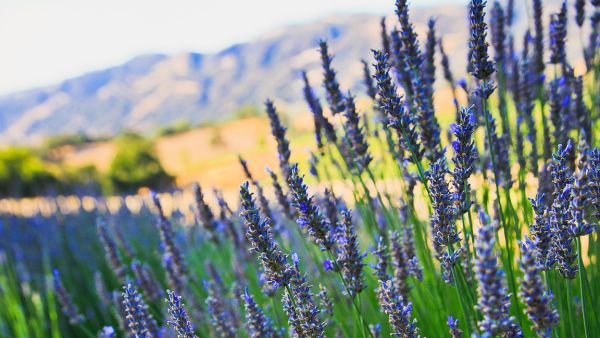High-Altitude Lavender | History's Most Calming Botanical

Lavender, known by it's Latin name as Lavandula, has captivated our senses for millennia, not just with its delightful aroma but also with its extensive medicinal and therapeutic properties.
High-altitude lavender, with its unique adaptogenic properties and rich phytochemical content, stands out for its enhanced phytochemical richness which play a pivotal role in enhancing skin health and emotional well-being.
History and traditional uses of lavendar
The story of lavender is woven deeply into the fabric of history, dating back to ancient civilizations.
In Ancient Egypt, lavender played a crucial role in the mummification process and perfumery.
It is famously associated with Cleopatra's seduction of Julius Caesar and Mark Antony. Its protective qualities were revered, believed to ward off evil spirits and diseases such as the plague and cholera in medieval Europe.
In Roman times, lavedar was a symbol of cleanliness and purity. Fun fact, its name is derived from the Latin lavare, meaning "to wash," indicative of its use in Roman bathing rituals.
Lavender's healing properties were also recognized in early medicine by Greek physician Dioscorides and further celebrated by herbalist John Parkinson and in Traditional Chinese Medicine for its cooling and soothing effects.
The 20th century saw the pioneering work of French chemist Rene-Maurice Gattefosse, who, after experiencing lavender's healing effects first hand. After sustaining a burn on his hand he famously plunged it into a vat of lavender oil and was reportedly astonished at the speed with which his hand healed.
Gattefosse's study of lavendar contributed significantly to the foundation of modern aromatherapy, highlighting its antimicrobial and skin regeneration benefits.
The unique benefits of high-altitude lavender
Enhanced relaxation and improved sleep
The sedative properties of high-altitude lavender essential oil have been well-documented, showing significant improvement in sleep quality and stress reduction. Its intense aroma, rich in linalool and linalyl acetate, contributes to its calming effects on the nervous system.
Anti-inflammatory effects
Research highlights lavender oil's ability to mitigate inflammatory responses and soothe skin conditions. Its anti-inflammatory properties make it an excellent choice for reducing redness and discomfort on reactive skin.
Antimicrobial activity
Lavender oil's broad-spectrum antimicrobial properties are effective against skin pathogens, supporting its traditional use in cleansing wounds and preventing infections.
Promotes skin recovery and collagen synthesis
Studies have shown that lavender essential oil may help speed skin recovery by enhancing fibroblast activity and collagen synthesis. This property is crucial for improving skin health and integrity.
Guards against premature aging
The polyphenols in high-altitude lavender offer significant antioxidant protection, safeguarding the skin from environmental stressors, UV damage, and preventing signs of premature aging.
Lavender in skincare & wellness
The historical and scientific narratives of lavender converge to underscore its timeless appeal and enduring value in skincare and wellness.
High-altitude lavender, with its unique adaptogenic properties, represents the pinnacle of this botanical's potential, offering a holistic approach to nurturing the skin and calming the mind.
Incorporating high-altitude lavender into your daily routine can help to enhance sleep quality, reduce stress, promote skin health and protect against premature aging.
Lavender oil is a true testament to the power of nature in supporting our overall well-being.
Lavender's journey from ancient rituals and royal endorsements to modern-day aromatherapy and skincare formulations encapsulates its multifaceted role as a botanical treasure.
As we continue to explore and appreciate lavender's many benefits, we honor a tradition that blends ancient wisdom with contemporary science, ensuring that lavender remains a cherished ingredient in our pursuit of natural health and beauty.
Article References
- Lytle, J., et al. (2014). "Study on the Effect of Inhalation of Lavender Essential Oil on Patients with Insomnia." Journal of Alternative and Complementary Medicine.
- Donelli, D., et al. (2019). "Effects of Lavender on Anxiety: A Systematic Review and Meta-Analysis." Phytomedicine.
- Sánchez-Vidaña, D. I., et al. (2017). "The Effectiveness of Lavender Essential Oil on Inflammatory Responses and Skin Conditions." International Journal of Molecular Sciences.
- Zu, Y., et al. (2010). "Antimicrobial Activity of Lavender Oil Against Common Skin Pathogens." Evidence-Based Complementary and Alternative Medicine.
- Mori, H. M., et al. (2016). "Accelerated Wound Healing by Lavender Essential Oil in Mice." BMC Complementary Medicine and Therapies.
- Pandey, K. B., & Rizvi, S. I. (2009). "Plant Polyphenols as Antioxidants in Human Health and Disease." Free Radical Biology and Medicine.



